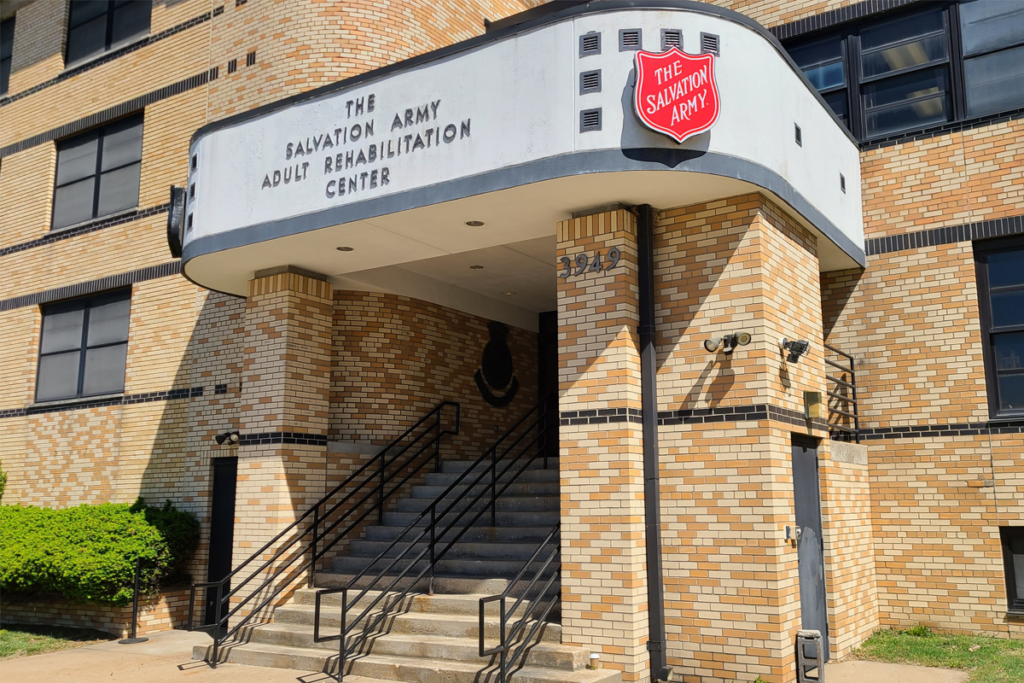
Men who need a safe space to recover from alcohol and drug addiction at no cost can find it at The Salvation Army Adult Rehabilitation Center at 3949 Forest Park Ave. in St. Louis. The 180-day residential program includes housing, food, counseling, and life skills coaching.
Program beneficiaries must be 21- to 65-year-old males, pass a drug test and breathalyzer upon arrival, be able to perform a work therapy assignment for a maximum of eight hours per day, and agree to participate in all program activities. The program does not accept individuals that have been convicted of a violent crime or arson.
Jamarcus
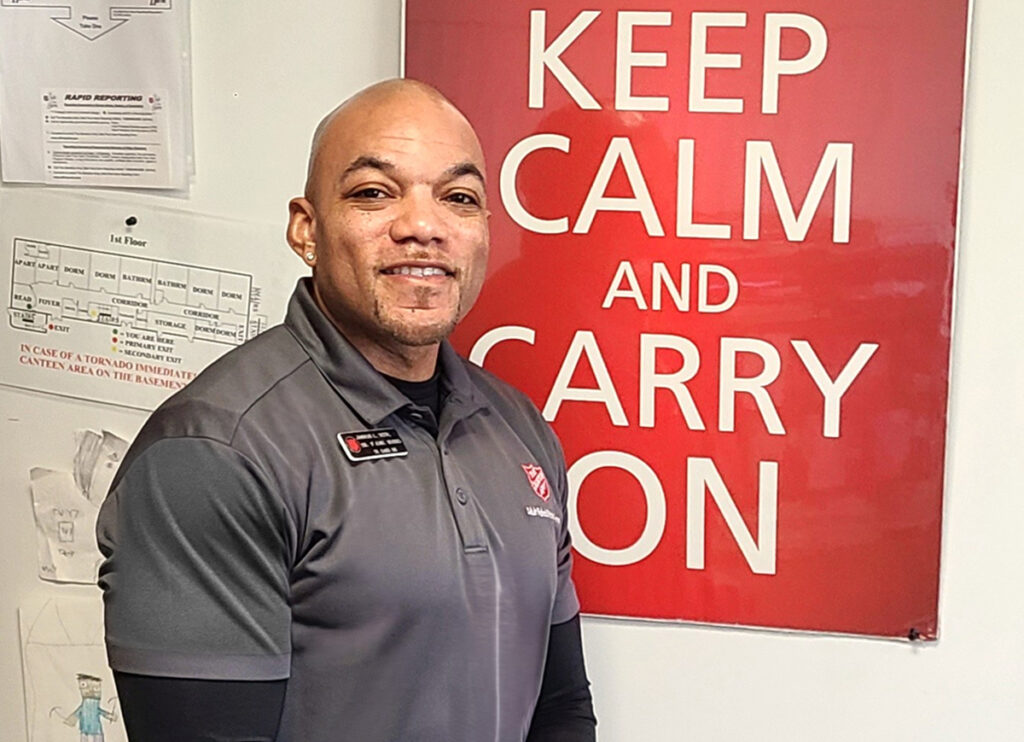
Director of Rehabilitation Services Jamarcus Smith, Sr., has worked with the Center for 10 years, but he started there as a beneficiary.
Jamarcus grew up in East St. Louis under the care of his grandmother. She expected him to attend church weekly and keep up his grades, which he did. “I didn’t know we were poor,” he says. “I have, in my eyes, always experienced success.”
An avid baseball player in high school, Jamarcus was offered a chance to play in the minor leagues. His grandmother, however, gave him two choices: go to college or work with his uncles at Granite City Steel. He chose to go to college, which he thinks was a great decision.
In 1999, Jamarcus met his future wife the first week he attended Southern Illinois University Edwardsville. They married after college and welcomed the first of their three sons.
Jamarcus worked for many years recruiting athletes, first in Chicago for SIU-E, and then at DePauw University in Indiana, where he was the Coordinator for Multicultural Recruitment. He grew tired of always being on the road and wanted to work in a local university office, but he says, “God didn’t see it that way.” He got a job teaching in the first Excel Center, a high school program for adults formed by Goodwill of Central & Southern Indiana.
As early as 13 years old, Jamarcus says, “Everything I did came with a celebratory drink.” He celebrated this way for nearly 20 years. He says his addiction stemmed from the pressure of the four faces he had to put on: one for family, one for school, one for street life, and one for who he really was.
“Somewhere along the line, I lost my mind,” Jamarcus says, and his relationship with his family became strained. His wife relocated to St. Louis with their sons; he moved back into his childhood home. In December 2013, he had a grand mal seizure and a heart attack. He spent one week in the hospital and another week in a hotel. The day after Christmas, he began his stay at the Adult Rehabilitation Center.
By his fourth month at the ARC, Jamarcus was offered a staff job. “I had no desire to work here—in this field,” he admits, but he decided to follow the path that God had for him. He repaired his relationship with his family.
“Everything I had lost, God restored a thousandfold.” Jamarcus says God gave him a purpose: to build bridges. “When I see a man come into this place, broken, busted, and disgusted—it’s not about the addiction; it’s about his decision-making.” He says the program gives people the structure, discipline, and tools to abstain from drugs and alcohol.
Entering the program
The adult rehabilitation centers are managed and funded separately from other Salvation Army corps, which include churches, disaster relief agencies, and youth groups. The ARC in St. Louis is managed by The Salvation Army Adult Rehabilitation Centers Command in Chicago and funded 80 percent by thrift store sales.
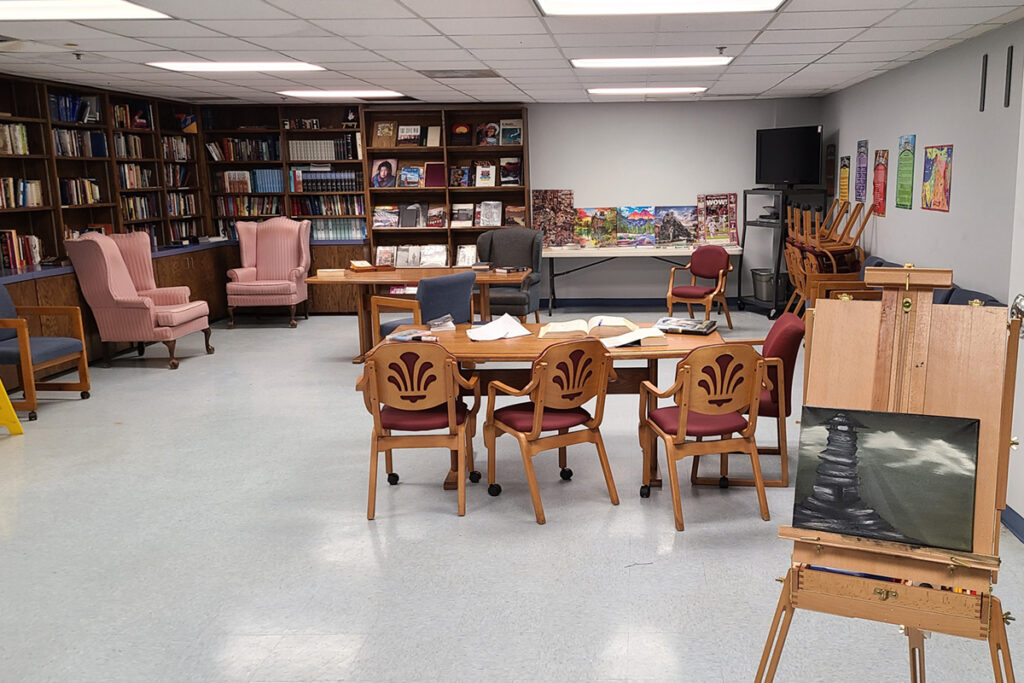
The ARC operates 24/7 and features dormitory housing, a canteen, recreational area, library, barber shop, laundry facility, clothing room, toiletries store, weight room, a chapel, a medical suite, and a large warehouse.
Men enroll in the program by phone or in-person and complete an assessment. If accepted, they are assigned one of 87 beds, about eight to 10 per room, on one of three floors. They are each given a rule book, which the staff will go over with them.
The beneficiaries must agree to live and work there for 180 days. The first 30 days, men are restricted to staying in the building, unless they have a medical appointment or emergency, and are not allowed to use cell phones. “We want to try to reduce as much outside noise and activity as possible,” Jamarcus says.
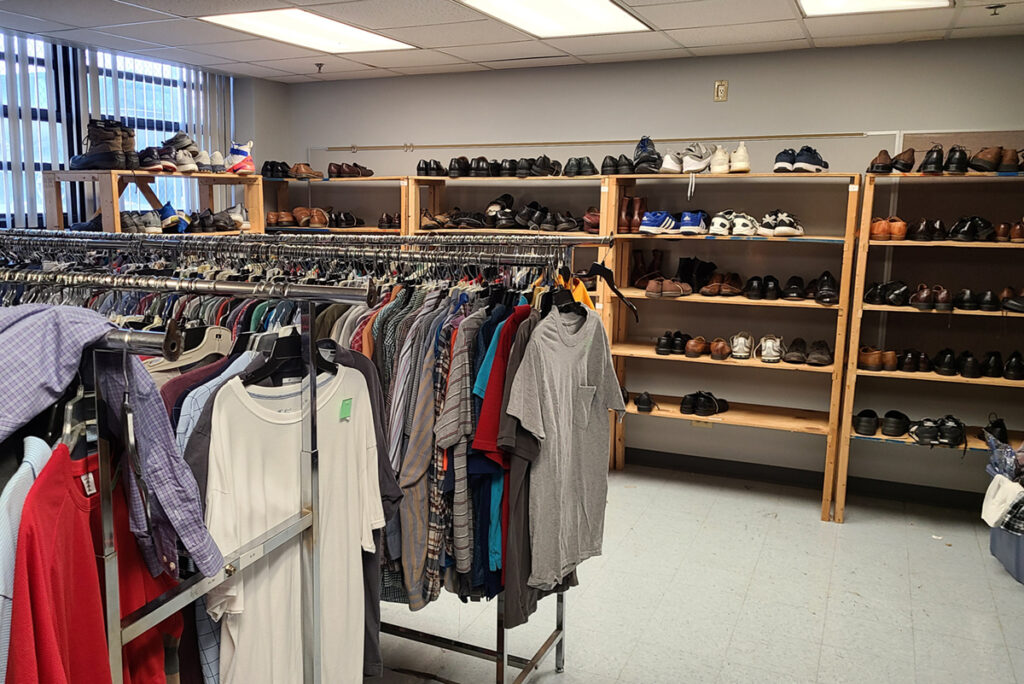
The lights at the ARC are out at 9 p.m. and the front door is locked at 11 p.m. “We don’t want to take your freedom away,” Jamarcus says, “We want to give you some structure and discipline.”
The men are given journals throughout their stay specifically designed for the program from The Change Companies, a national multimedia company focused on behavior change. Each journal focuses on an aspect of living with addiction, such as Denial, Work Therapy, Feelings, and Family Relationships. The men are expected to use the journals but are not required to share what they write.
The men are given six outfits for their stay, including dress shoes. The men also get first pick of donated shoes.
“The best kept secret”
During the day, the men are engaged in work therapy, processing all donations given to the Salvation Army thrift stores.

Men who aren’t skilled at repair or assembling furniture can sort and tag items for shipping. Electronics are tested to see if they work, need repairs, or should be sent to recycling. Jamarcus says the goal is to waste nothing. Clothes that do not sell or are slightly damaged are bound in large bails and shipped to Africa.
Beneficiaries are given free breakfast, lunch, and dinner plus two canteen cards per week to purchase snacks or a fourth meal. The men receive a weekly gratuity ranging from $13 to $31 based on their progress. On Fridays, the men can buy toiletries and snacks at the “general store.” Jamarcus says the men learn how to manage everything they need on a few dollars.
Beneficiaries are expected to make their beds and take care of their areas. Men who keep their beds well-made can receive a Best Bed award. Those who receive multiple warnings about consistently unkempt beds, may be “referred elsewhere,” a term used for any exit from the program.
In the evening, the beneficiaries go to classes and counseling. On Fridays, they participate in Celebrate Recovery, a Christ-centered 12-step recovery program. On Sundays and Wednesdays, the men go to chapel.
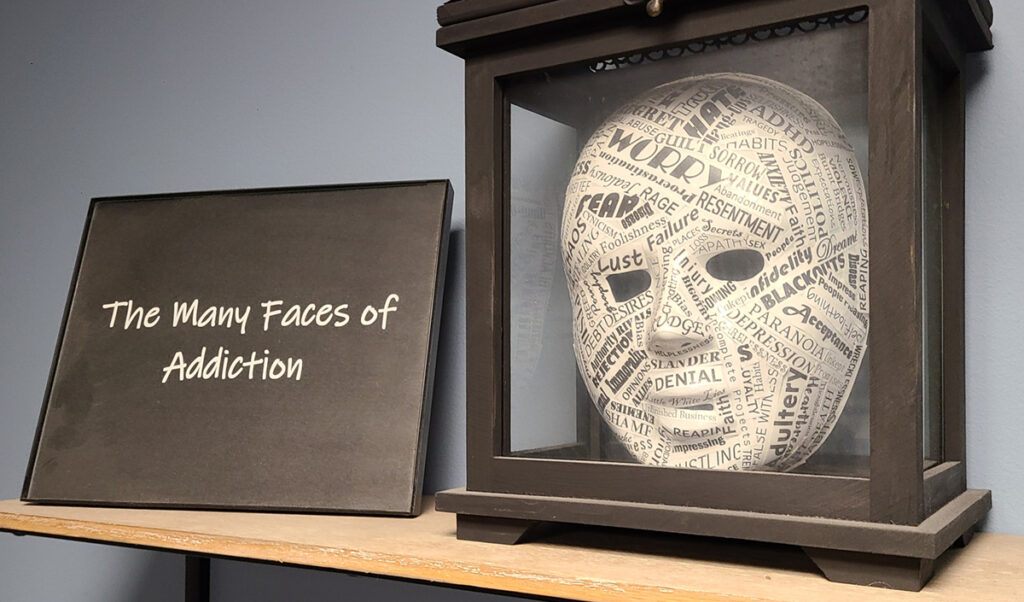
Counselors and Affinia Healthcare staff can use the medical suite—a waiting room and two patient rooms—to care for the men. Jamarcus says the ARC provides transportation to those who need medical care elsewhere.
The large activity room has pool tables, couches, a big screen TV, and an indoor garden tower. Playing cards and some board games are no longer allowed because they have led to gambling or fighting—an immediate expulsion.
The men may also engage in sports, such as softball or bowling, playing against other Salvation Army entities. On occasion, they have outings such as attending St. Louis Cardinals baseball games.
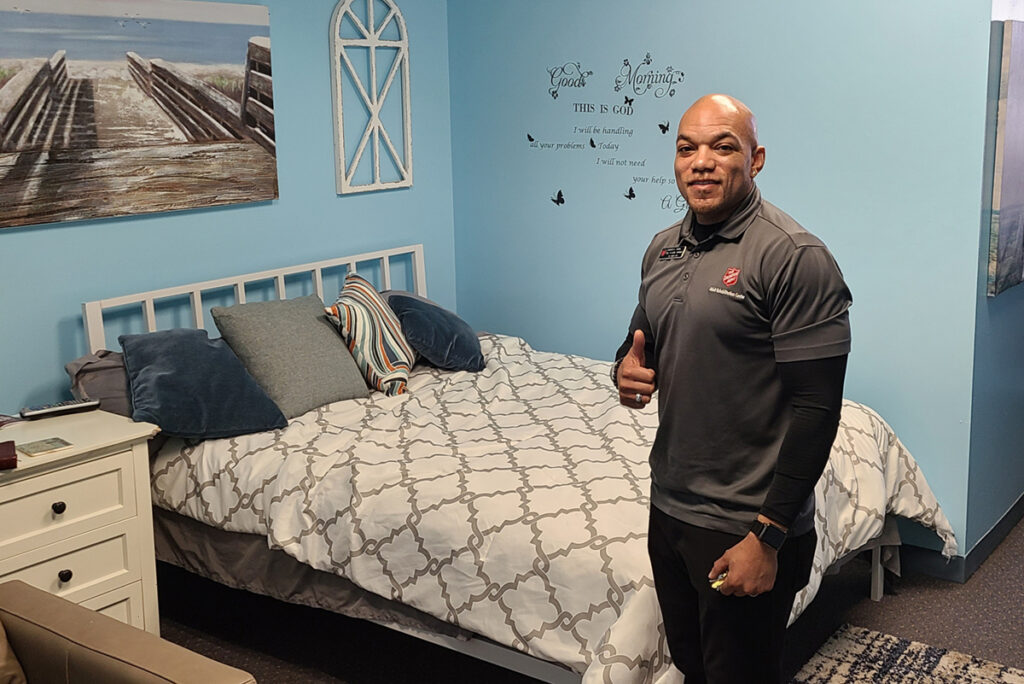
Every week, a “Resident of the Week” is identified and a certificate attesting to the fact is put in the display case. At the end of the month, a drawing is held for a one-weekend stay in the newly decorated suite, which includes a bathroom. The occupant can have his food catered from the canteen, play video games, and watch cable; however, company is not allowed.
Men who stay in the program for 180 days are considered graduates but may apply to live there for another six months. The goal during that time is for the person to get a job and housing. Once the men are employed, they have 60 days to find housing.
Before the COVID pandemic, Jamarcus says the ARC averaged 75 to 80 men in the program. In 2020, the maximum number of beneficiaries was reduced by half. Jamarcus says although capacity has gone back to pre-pandemic levels, they are rarely above 50 to 55 residents. He thinks fewer men are willing to commit to long-term recovery.
Jamarcus says some men want to stay indefinitely. “I call it a men’s fellowship,” he says, and likens it to a bird’s nest where some men may need a nudge. Eleven percent of graduates have returned to the program.
Jamarcus appreciates the public’s awareness of the thrift store deals, but he doesn’t like being “the best kept secret when it comes down to recovery.”